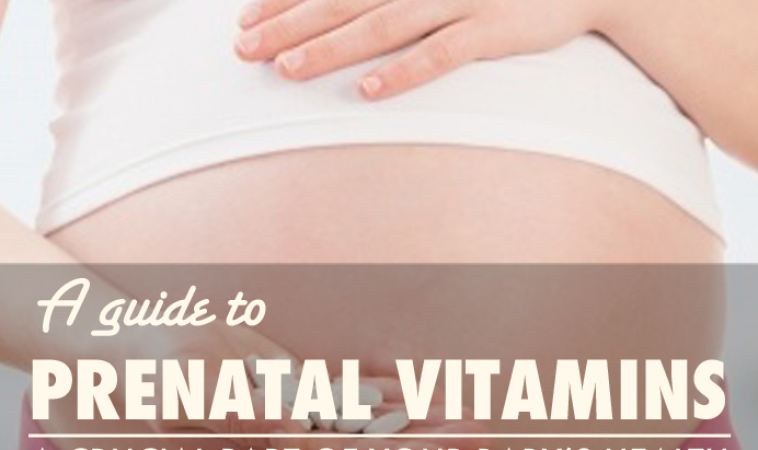With a plethora of prenatal vitamins on the market, it’s no wonder expecting women can be overwhelmed by the vast choices they are exposed to. Not all prenatal vitamins are made equal and choosing the right one is extremely important. The right prenatal formulation can influence and optimize the growth and development of your growing bundle of joy. Benefits of prenatal vitamins have been repeatedly represented clinical trials, with findings that prenatal vitamins are not only important for the growing fetus, but a good quality prenatal can also help expecting moms stay healthy during their pregnancy. Prenatal vitamins have been found to reduce the risk of low birth weights and pregnancy-related complications such as gestational diabetes, and pregnancy induced high blood pressure.1
When looking at a prenatal vitamin, it’s important the supplement to have good forms of these vitamins – ones that are best absorbed by the body – and at the correct dosages. Typical over the counter drugstore bands contain minerals and vitamins in forms that are typically not well utilized by the body. When it comes to choosing the best prenatal, these are 3 key elements to look for to ensure that you are getting the best quality supplement on the market.
- First and foremost, choose a multi-mineral vitamin, not just a vitamin with folic acid and iron. While iron and folic acid are extremely important for the development of the baby, other vitamins and minerals that keep life functions are essential for pregnancy. In fact, a recent review study found that multivitamins (containing 5 or more micronutrients) better reduced the risk of low birth weight compared to supplements only containing iron and folic acid.2, 3 During times when diets may not be most optimal, due to factors such as busy schedules, nausea and food aversions that come along with pregnancy, it is important that we make up for the nutrients we may be lacking with a prenatal vitamin rich in these factors. The best absorbed prenatal vitamins forms contain activated B vitamins, vitamin D3, and minerals such as iodine (potassium iodide), and citrate forms of minerals (calcium, magnesium, selenium, copper etc.).
- Look for activated folic acid in the form of 5-Methyltetrahydrofolate (5-MTHF). Folic acid has been long known to help the aid the development of the growing baby, most commonly used to reduce the risk of neural tube defects.4 A growing field of medicine called epigenetics is paving ways to see how people are genetically prone to breakdown certain vitamins and minerals. The most common and well-researched area in this field is the ability of the body to convert folic acid in to it’s activated form 5-MTHF. 5-MTHF, along with Vitamin B12 and B6, helps the body breakdown a compound called homocysteine, in which elevated levels of homocysteine is tied to increased risk of cardiovascular disease.5 It has been found that certain people may have a genetic mutation that renders them unable to convert folic acid to 5-MTHF – most people are unaware of this mutation as it typically does not alter day-to-day function. By finding a prenatal vitamin that contains 5-MTHF, along with Vitamin B12 and B6, can bypass any negative effects that can by caused by this genetic mutation. 5-MTHF has shown to have its advantages over folic acid, as 5MTHF has been found to be safe at higher dosages, does not mask potential B12 deficiencies and has less interactions with drugs that affect folic acid absorption.6,7 5-MTHF supplementation (dosages up to 15mg daily) in pregnancy has been found to reduce the risk neural tube defects, and high blood pressure (preclampsia).4,8 Typical daily dosing of 5-MTHF in a quality prenatal vitamin should equal 1mg daily.
- It contains choline: Choline is an essential nutrient for pregnancy not commonly recognized and discussed. Maternal choline stores are in high demand as a great amount of choline is being transferred to the baby across the placenta during pregnancy and then through the breastmilk.9 Choline has been found to improve circulation to the placenta, reduce mother’s risk of developing high blood pressure, and has been found to keep the mother’s and baby’s liver healthy during pregnancy.9,10 With regards to development of the baby, studies have found that low choline intake (under 150mg) is associated with neural tube defects and cleft palate.9 As we are still in the early stages of learning what choline can do for the fetus, we are still examining its effects in rat/mice models, showing promising effects of choline in perinatal health. These models have shown the potential of high dosage choline supplementation in the reduction of anxiety and social interaction in autism,11 improved brain function in baby rats with Down’s Syndrome and Alzheimer’s disease,12 and may even improve the mother’s and baby’s response to stress.13 Dietary sources of choline are limited to eggs, milk, wheat, and beef. It is actually quite difficult for expecting women to get the full amount of choline through their diet (450 and 550 mg/day) and therefore is important to supplement additional choline in order to ensure the baby is getting the full amount and benefit from this nutrient.14
When choosing a prenatal vitamin, it is important to look for these specific ingredients as they can determine the overall quality of your vitamin. It is also important to find a formulation that uses capsules from vegetarian sources, and non-genetically modified, and vitamins that do not contain preservatives and dyes. Another trick to determining a quality prenatal vitamin is to pick one that requires you take 2-3 capsules daily – one a day vitamins typically do not provide the optimal dosages of vitamins required for pregnancy needs. It is optimal to start taking your prenatal vitamin 3 months prior to conceiving in order to ensure any vitamins that may be lacking from the diet are replenished for the best health for you and the baby. Lastly, please note that prenatal vitamins do not replace a healthy diet full of colour vegetables and fruit – these are the best and most bioavailable sources of vitamins and minerals available to you.
 Dr. Tanya Lee, N.D. received her Honours Bachelor of Science degree in Biochemistry and Biomedical Sciences from McMaster University, and was trained as a Naturopathic Doctor at the Canadian College of Naturopathic Medicine. Dr Lee practices full-time between two clinics located in Toronto and Milton Ontario and has been voted Milton’s favourite Naturopath in 2013 and 2014. Her primary care practice focuses on family medicine, treating a wide variety of conditions such as hormonal (endocrine) disorders, fertility, digestive problems, cardiovascular disease, diabetes, insomnia and fatigue. She has a special interest in the treatment of autoimmune diseases, paediatric and perinatal health. Tanya offers her clinical knowledge to a number of publications, including the Natural Path.
Dr. Tanya Lee, N.D. received her Honours Bachelor of Science degree in Biochemistry and Biomedical Sciences from McMaster University, and was trained as a Naturopathic Doctor at the Canadian College of Naturopathic Medicine. Dr Lee practices full-time between two clinics located in Toronto and Milton Ontario and has been voted Milton’s favourite Naturopath in 2013 and 2014. Her primary care practice focuses on family medicine, treating a wide variety of conditions such as hormonal (endocrine) disorders, fertility, digestive problems, cardiovascular disease, diabetes, insomnia and fatigue. She has a special interest in the treatment of autoimmune diseases, paediatric and perinatal health. Tanya offers her clinical knowledge to a number of publications, including the Natural Path.
References:
- Zerfu TA, Ayele HT. Micronutrients and pregnancy; effect of supplementation on pregnancy and pregnancy outcomes: a systematic review. Nutr J. 2013;12:20. doi:10.1186/1475-2891-12-20.
- Ramakrishnan U1, Grant FK, Imdad A, Bhutta ZA, Martorell R. Effect of multiple micronutrient versus iron-folate supplementation during pregnancy on intrauterine growth. Nestle Nutr Inst Workshop Ser. 2013;74:53-62. doi: 10.1159/000348401.
- Bhutta ZA, Imdad A, Ramakrishnan U, Martorell R. Is it time to replace iron folate supplements in pregnancy with multiple micronutrients? Paediatr Perinat Epidemiol. 2012 Jul;26 Suppl 1:27-35. doi: 10.1111/j.1365-3016.2012.01313.
- Obeid R, Holzgreve W, Pietrzik K. Is 5-methyltetrahydrofolate an alternative to folic acid for the prevention of neural tube defects J Perinat Med. 2013 Sep 1;41(5):469-83. doi: 10.1515/jpm-2012-0256.
- Varga EA, Sturm AC, Misita CP, Moll S. Cardiology patient pages. Homocysteine and MTHFR mutations: relation to thrombosis and coronary artery disease. Circulation. 2005;111 (19):e289–e293
- Pietrzik K, Bailey L, Shane B. Folic acid and L-5-methyltetrahydrofolate: comparison of clinical pharmacokinetics and pharmacodynamics. Clin Pharmacokinet. 2010 Aug;49(8):535-48. doi: 10.2165/11532990-000000000-00000.
- Houghton LA1, Sherwood KL, Pawlosky R, Ito S, O’Connor DL. [6S]-5 Methyltetrahydrofolate is at least as effective as folic acid in preventing a decline in blood folate concentrations during lactation. Am J Clin Nutr. 2006 Apr;83(4):842-50.
- J Saccone G1, Sarno L, Roman A, Donadono V, Maruotti GM, Martinelli P. 5-Methyl-tetrahydrofolate in prevention of recurrent preeclampsia.Matern Fetal Neonatal Med. 2015 Mar 17:1-5.
- Zeisel SH.Nutrition in pregnancy: the argument for including a source of choline. Int J Womens Health. 2013 Apr 22;5:193-9. doi: 10.2147/IJWH.S36610. Print 2013.
- Jiang X, Bar HY, Yan J, Jones S, Brannon PM, West AA, Perry CA, Ganti A, Pressman E, Devapatla S, Vermeylen F, Wells MT, Caudill MA. A higher maternal choline intake among third-trimester pregnant women lowers placental and circulating concentrations of the antiangiogenic factor fms-like tyrosine kinase-1 (sFLT1). FASEB J.2013;273:1245-53. doi: 10.1096/fj.12-221648.
- Langley EA, Krykbaeva M, Blusztajn JK, Mellott TJ. High maternal choline consumption during pregnancy and nursing alleviates deficits in social interaction and improves anxiety-like behaviors in the BTBR T+Itpr3tf/J mouse model of autism. Behav Brain Res.2015;278:210-20. doi: 10.1016/j.bbr.2014.09.043.
- Ash JA, Velazquez R, Kelley CM, Powers BE, Ginsberg SD, Mufson EJ, Strupp BJ. Maternal choline supplementation improves spatial mapping and increases basal forebrain cholinergic neuron number and size in aged Ts65Dn mice. Neurobiol Dis.2014;70:32-42. doi: 10.1016/j.nbd.2014.06.001
- Jiang X, West AA, Caudill MA. Maternal choline supplementation: a nutritional approach for improving offspring health? Trends Endocrinol Metab. 2014;25:263-73. doi: 10.1016/j.tem.2014.02.001.
- Caudill MA Pre- and postnatal health: evidence of increased choline needs.J Am Diet Assoc. 2010;110:1198-206. doi: 10.1016/j.jada.2010.05.009.

















